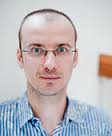Konstantin Khodosevich receives the Hallas Møller Investigator grant
What biological processes are needed to build a healthy brain? And what goes wrong in disorders of brain development?
These are the central questions behind the work of associate professor Konstantin Khodosevich, who has just received the Hallas Møller Investigator Grant of 10.845.657 DKK over a period of 5 years.

Precursor cells in the mouse brain that produce inhibitory neurons
- There are two types of neurons in the brain – excitatory and inhibitory. While excitatory neurons ensure that information is transmitted from one brain region to another, inhibitory neurons control how it will be transmitted. In order to process different kinds of information, our brain produces multiple types of inhibitory neurons during development. Each type of inhibitory neurons has certain function in the brain, and disruption of their production gives raise to different neuropsychiatric disorders, e.g. epilepsy, schizophrenia or autism. The goal of the project is to understand how multitudes of inhibitory neurons are produced in the brain, and how dysfunction of inhibitory neurons contributes to neuropsychiatric disorders, says Konstantin Khodosevich
The Hallas Møller Investigator grant is aimed at medical and natural sciences research, mainly within basic biomedical research, translational research and clinical research.
- The support of NNF will allow me to apply modern techniques to study how inhibitory neurons differentiate and mature in the normal and disordered brains. Thus, the grant will help me to understand how inhibitory system of the brain is built during development. Furthermore, the study will open new perspectives for disease diagnostics, for in vitro disease modeling, and for our understanding what kind of neuronal circuit disorganization could be treated for improvement of cognitive decline, says Konstantin Khodosevich
 Konstantin Khodosevich holds a PhD in molecular biology from the Russian Academy of Sciences in Moscow, Russia, and has since done extensive research at the Department of Clinical Neurobiology at the Heidelberg University Hospital in Germany. In 2015 he moved to Copenhagen, where he became a group leader at the Biotech Research & Innovation Centre, University of Copenhagen.
Konstantin Khodosevich holds a PhD in molecular biology from the Russian Academy of Sciences in Moscow, Russia, and has since done extensive research at the Department of Clinical Neurobiology at the Heidelberg University Hospital in Germany. In 2015 he moved to Copenhagen, where he became a group leader at the Biotech Research & Innovation Centre, University of Copenhagen.
The recipients will be celebrated at an official reception hosted by the Novo Nordisk Foundation on the 21st of April 2016.
Contact: Communications Officer Anne Rahbek-Damm, anne.rahbek@bric.ku.dk
